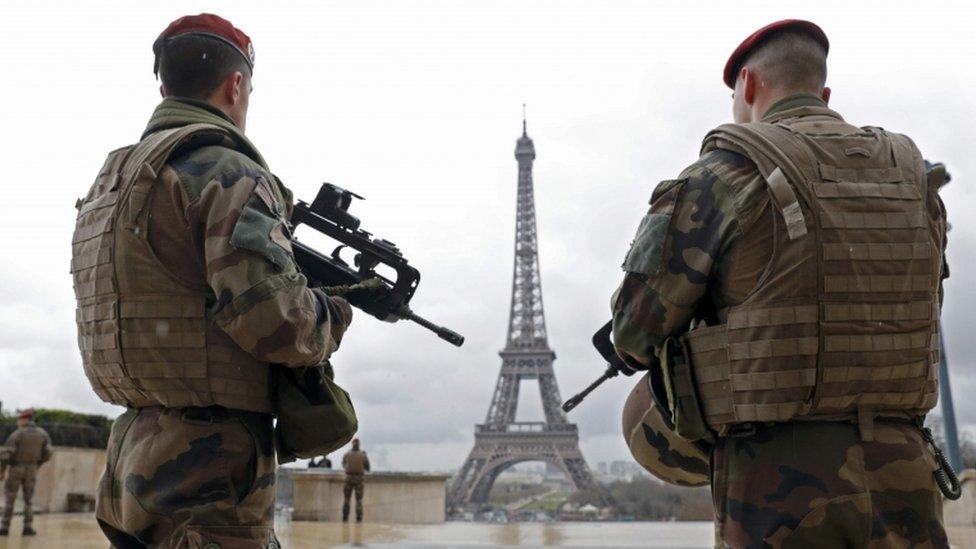Paris Champs Elysees shooting: Gunman was 'focus of anti-terror' probe
- Published
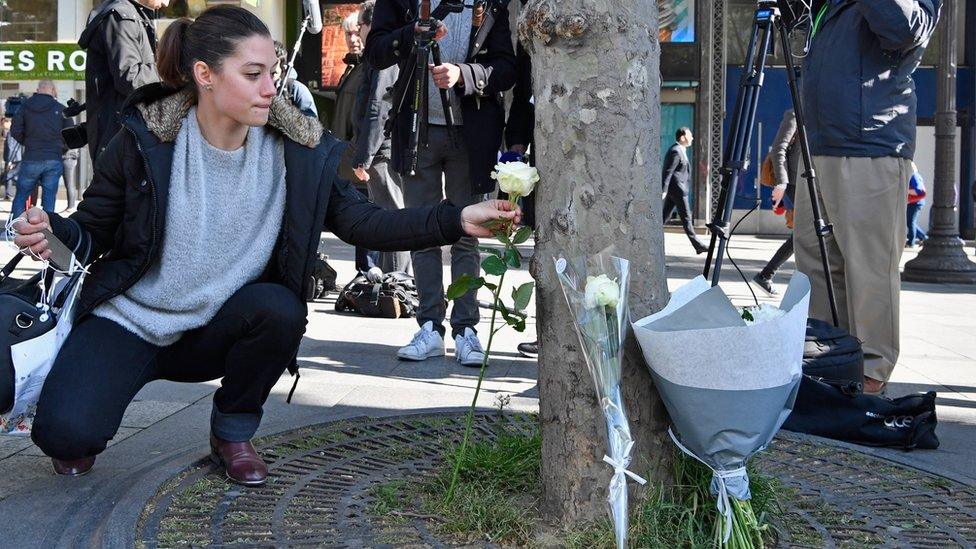
Many have expressed solidarity with the French police in the wake of the attack
The gunman who shot dead a policeman in Paris on Thursday has been identified from papers left in his car, but French officials are yet to release his name.
Local media say the 39-year-old lived in the city's suburbs, and had been seen as a potential Islamist radical.
The gunman wounded two police officers before being shot dead by security forces on the Champs Elysees.
A pump-action shotgun and knives were found in his car, the French TV station BFMTV reports.
Another man suspected of possible links to the attack has turned himself in to Belgian police.
French police have detained three members of the gunman's family, Reuters news agency reports, citing a legal source.
Prime Minister Bernard Cazeneuve said security forces, including elite units, were fully mobilised ahead of Sunday's presidential election.
"Nothing must be allowed to impede the fundamental democratic process of our country," he said after an emergency security cabinet meeting.
So-called Islamic State (IS) has said one of its "fighters" carried out the attack.
On Friday the main candidates were quick to urge tough action against Islamist terrorism but cancelled the final rallies they had planned.
Mr Cazeneuve, a Socialist, accused two of the frontrunners - far-right candidate Marine Le Pen and conservative François Fillon - of exploiting the attack for electoral gain. He scorned Ms Le Pen for linking the attack to immigration.
The shooting is a shocking event that will certainly be on voters' minds on Sunday, the BBC's Hugh Schofield in Paris says.
What happened on the Champs Elysees?
A car pulled up alongside a police bus just before 21:00 (19:00 GMT) and a man got out, opening fire on the bus with an automatic weapon, Interior Ministry spokesman Pierre-Henry Brandet said.
See how events in Paris unfolded
After killing an officer, Xavier Jugelé, the man attempted to run away while shooting at other officers, two of whom he injured, the spokesman added.
He was then shot dead by security forces.
Terrified eyewitnesses later recounted scenes of panic as they ran for cover.
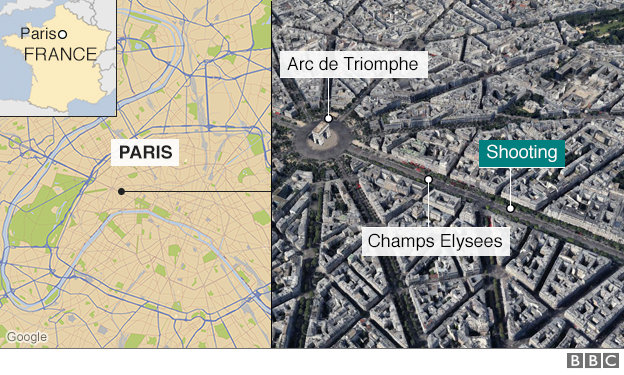
What is known about the attacker?
Paris prosecutor François Molins said shortly after the shootings that the attacker's identity was known and had been verified.
Belgium's interior minister told VRT public broadcaster that the gunman was a French national.
The man, named by French media as Karim Cheurfi, 39, from the eastern Paris suburb of Chelles, was convicted in the early 2000s of attempted murder in the shooting of two police officers and served several years in prison.
More recently the intelligence services identified him as a potential Islamic radical, French media say.
Police searched an address in Chelles overnight.
Meanwhile, IS named the attacker as Abu-Yusuf al-Baljiki, in a statement carried by its Amaq news outlet.
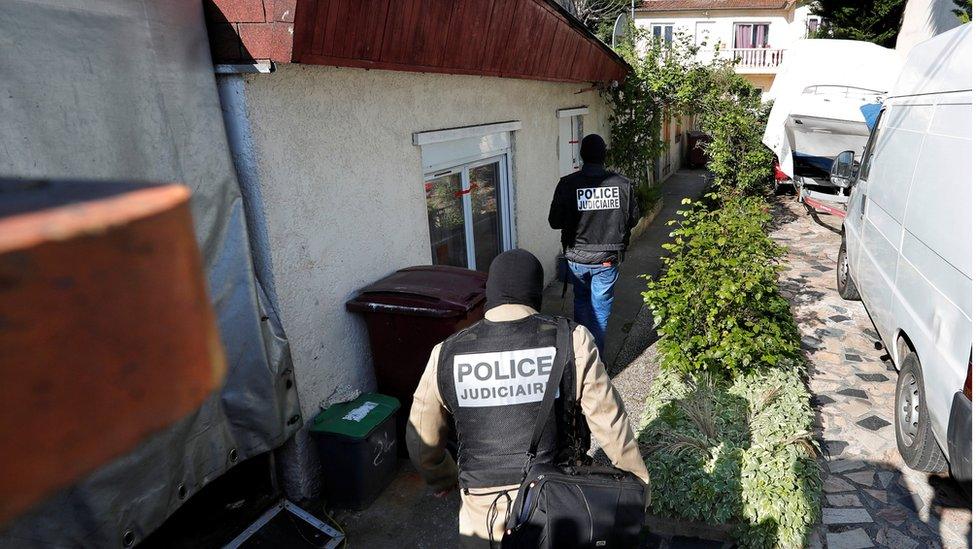
Police searched an address in the Paris suburb of Chelles
How can individuals commit authorities if they are known to authorities?
The French security services are aware of thousands of individuals with links to, or sympathies for, international terrorism.
But how to monitor them comes down to a constantly shifting balancing act between resources and priorities, says BBC security correspondent Frank Gardner.
Until one of those individuals actually breaks the law by commissioning, instigating or preparing a terrorist plot it is hard to take them off the streets, let alone convict them.
Watching somebody around the clock, both digitally and physically, is hugely resource intensive, so the watchers focus on those considered most dangerous. In this way, others considered more minor players are sometimes able to slip through the surveillance net, with fatal consequences, he says.
Could the attack influence the election?
The attack took place as the 11 candidates in Sunday's tight presidential election race were engaged in a final joint TV appearance to argue their policies.
It would easy to assume that Marine Le Pen - so outspoken about security, migration and Islamic fundamentalism - could benefit at the ballot box, says BBC Europe editor Katya Adler.
But anxious voters may turn, instead, to experienced conservative former Prime Minister François Fillon.
Emmanuel Macron and Jean-Luc Mélenchon will be all too aware that few see them as foreign and security policy heavyweights.
Interior Ministry spokesman Pierre-Henry Brandet: "A man jumped out and opened fire on the police vehicle"

Recent terror attacks in France
7-9 Jan 2015 - Two Islamist gunmen storm the Paris offices of satirical magazine Charlie Hebdo, killing 17 people. Another Islamist militant kills a policewoman the next day and takes hostages at a Jewish supermarket in Paris. Four hostages are killed before police shoot the gunman dead. The other two gunmen are cornered and killed by police in a siege.
13 Nov 2015 - IS jihadists armed with bombs and assault rifles attack Paris, targeting the national stadium, cafes and Bataclan concert hall. The co-ordinated assault leaves 130 people dead, and more than 350 wounded.
13 Jun 2016 -A knife-wielding jihadist kills a police officer and his partner at their home in Magnanville, west of Paris. He declares allegiance to IS, and police later kill him.
14 Jul 2016 - A huge lorry mows down a crowd of people on the Nice beachfront during Bastille Day celebrations, killing 86. IS claims the attack - by a Tunisian-born driver, later shot dead by police.
26 Jul 2016 - Two attackers slits the throat of a priest at his church in Saint-Etienne-du-Rouvray, in Normandy. They are shot dead by police.
3 Feb 2017 - A machete-wielding Egyptian man shouting "Allahu akbar" attacks French soldiers at Paris's Louvre Museum - he is shot and wounded.
20 Apr 2017 - A known terror suspect opens fire at police on the Champs Elysees in Paris, killing one and wounding two. He is shot dead - and the assault is claimed by IS.
- Published21 April 2017
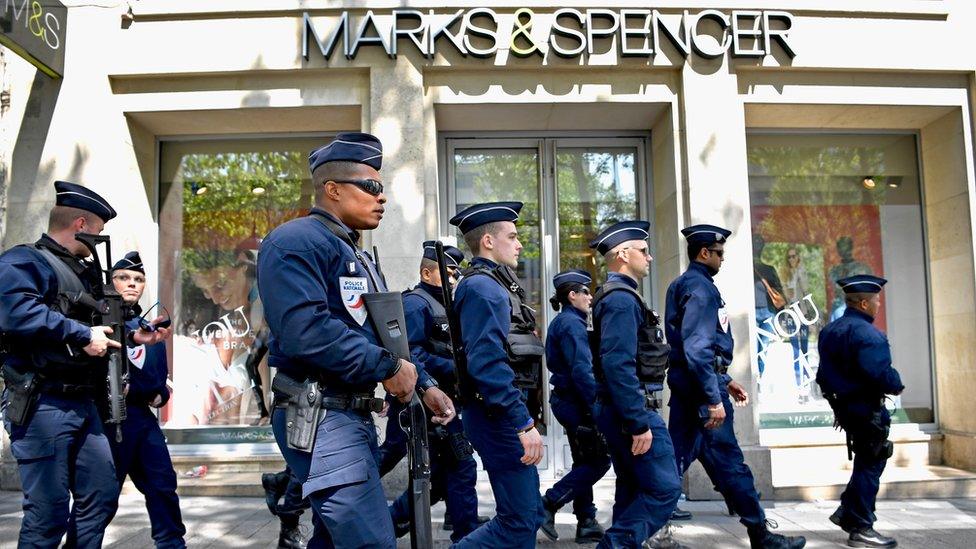
- Published21 April 2017
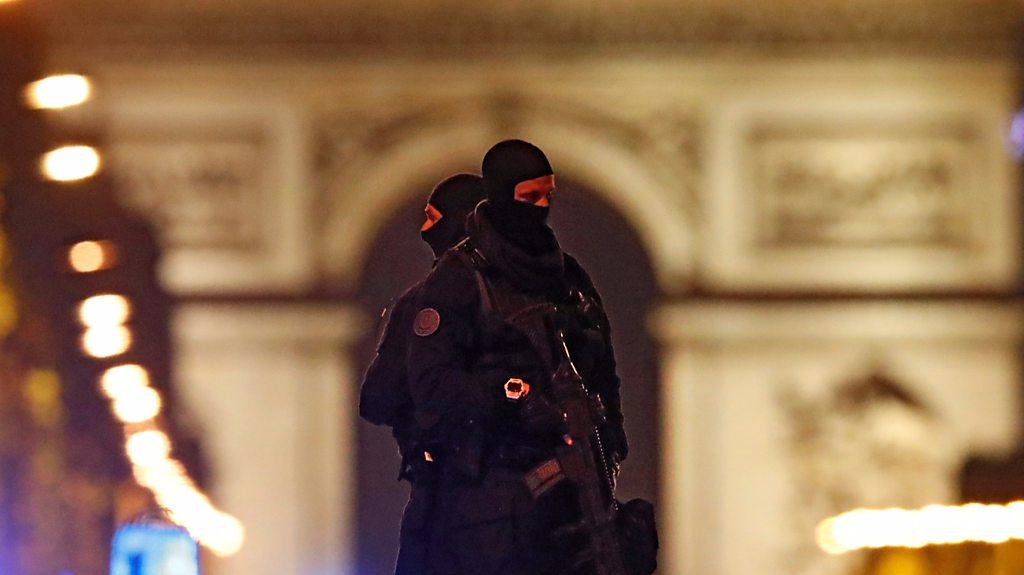
- Published20 April 2017
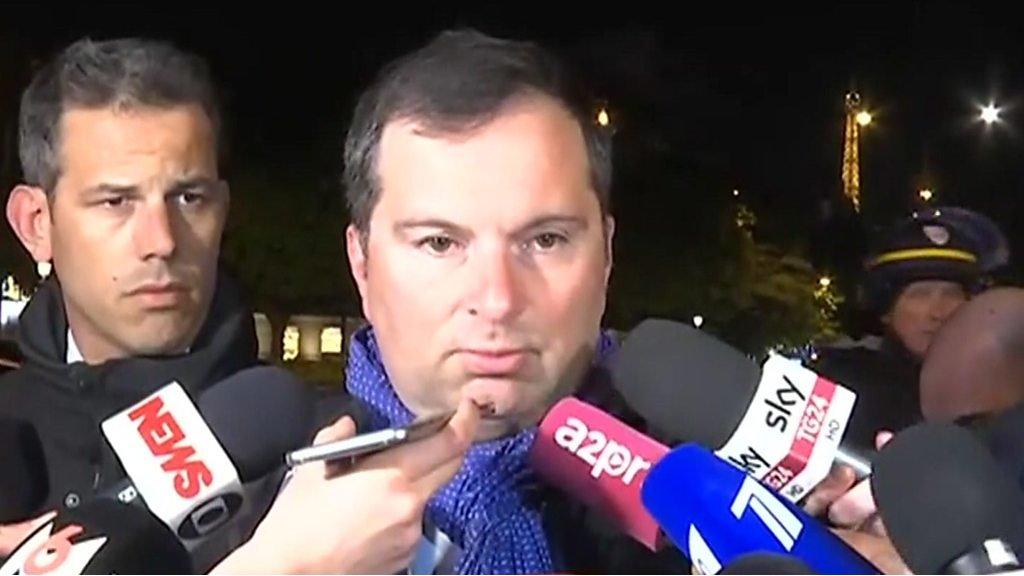
- Published21 April 2017
- Published18 April 2017
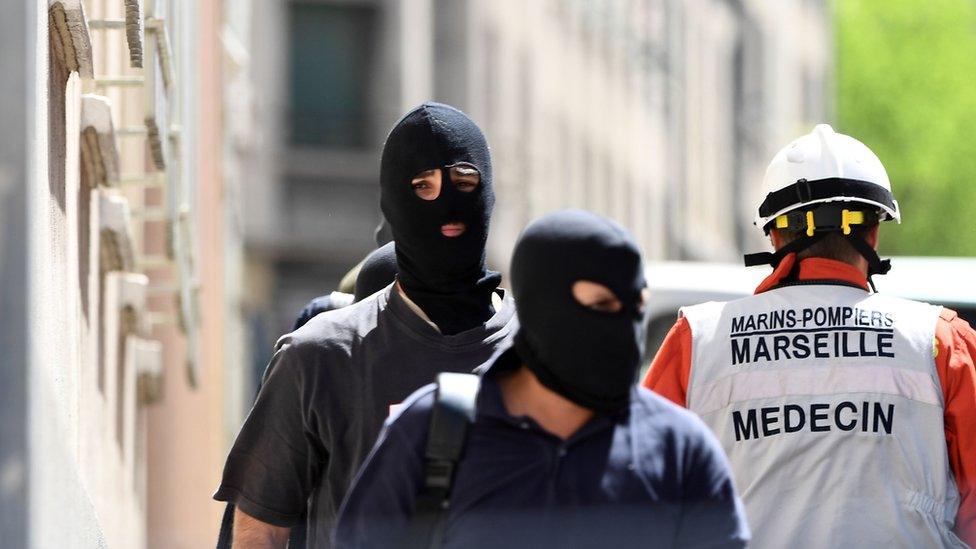
- Published24 April 2017
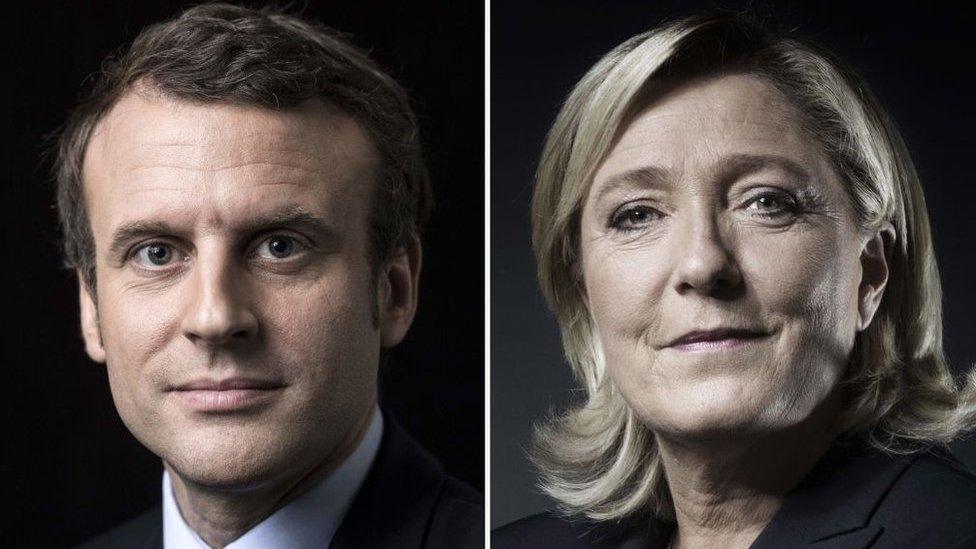
- Published18 April 2017
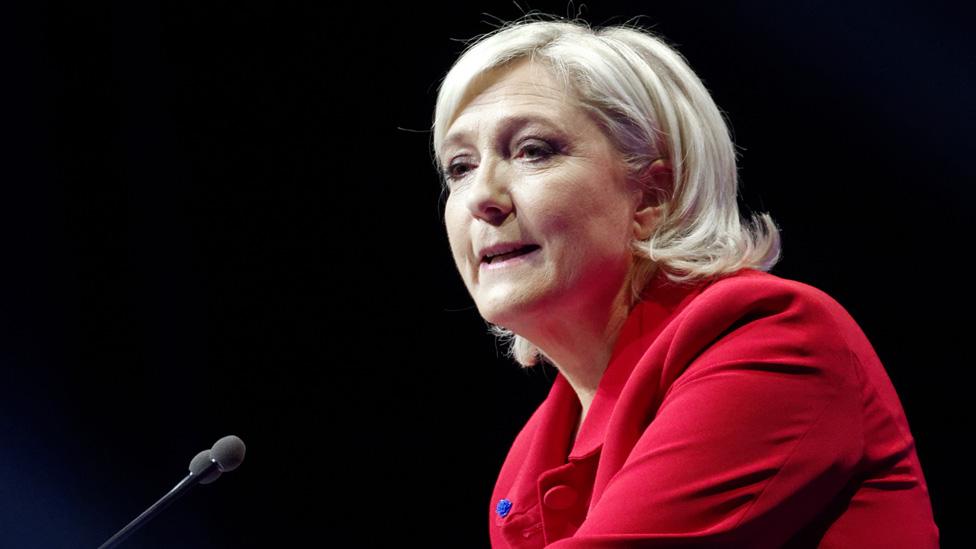
- Published10 February 2017
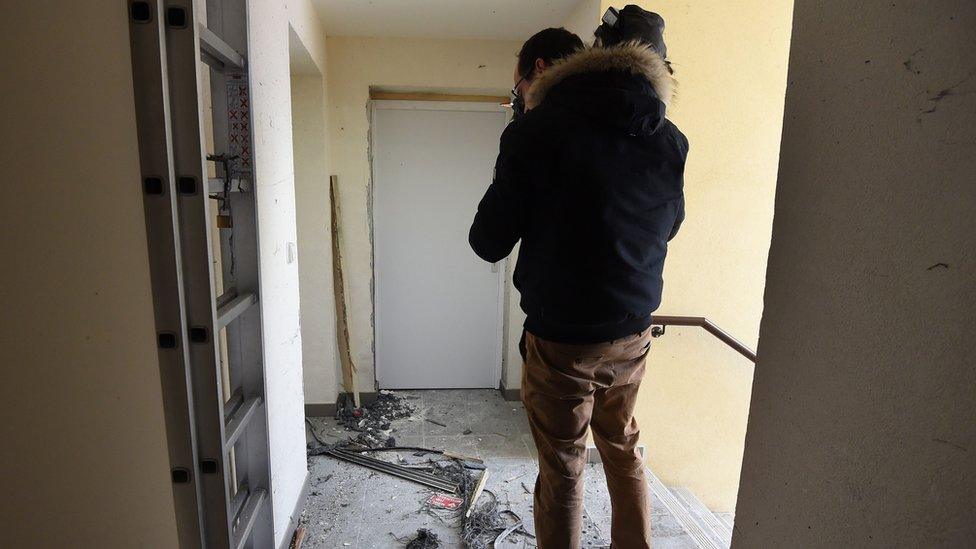
- Published10 December 2016
